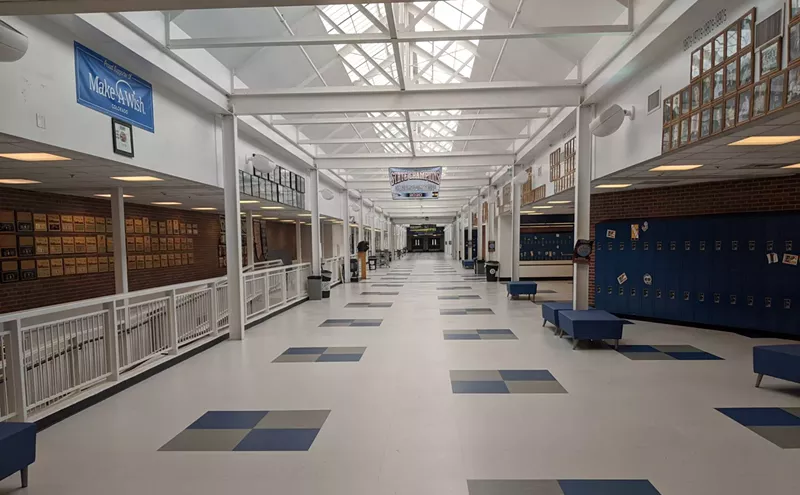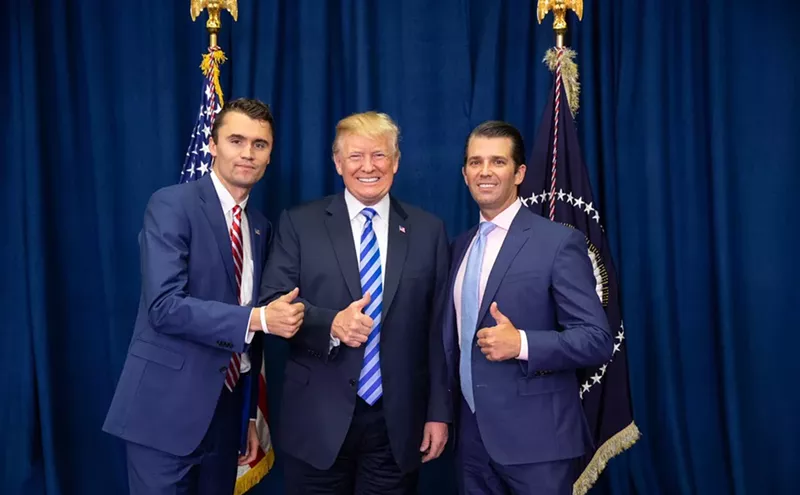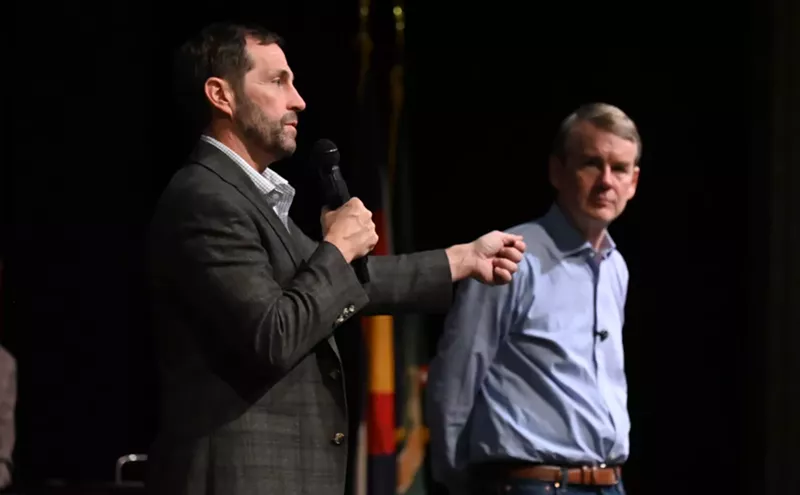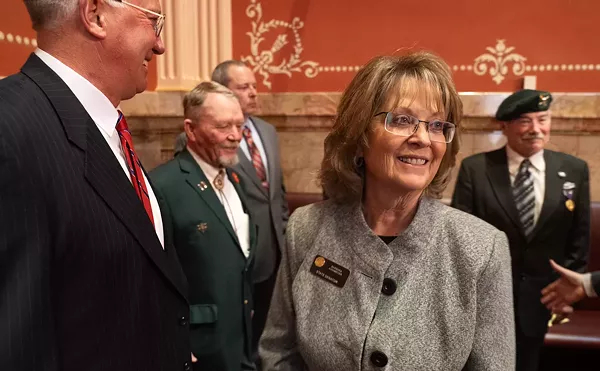"We're modern Robin Hoods," Oswald declares.
"Yeah," Wrench says. "Taking back radio from the rich."
If all goes well, the station should be on the air sometime this summer at a dial location Wrench, Galt and Oswald are keeping to themselves for now. In the meantime, they're preparing a sprawling fundraiser for the project, to be held June 18-20 at the Construct Creative Art Space, 3519 Brighton Boulevard. The Affairs and Born in the Flood have already signed on to participate, with more groups expected to commit as the big day nears.
Such an event isn't unprecedented. Boulder's KBFR, a pirate station that's been broadcasting on and off for the better part of three years ("The Making of a Pirate," October 4, 2001), staged a couple of successful benefit shows at the Fox Theatre, including a well-attended April 15 gig featuring Kan'Nal. Furthermore, KBFR, at 95.3 FM in Boulder, has a website, www.kbfr.org, that offers an extensive calendar, a request line, and information about DJs such as GranolaGirl.
The Denverites are clearly following the KBFR model; they've also assembled a website, www.denverradio.org, that gives updates on their mission. Even so, Wrench knows that publicly promoting an illicit undertaking is a gamble. "There's a tradeoff when it comes to doing what we want to do," he notes. "But we need to get the word out."
"We want people to realize that this will be their station," Galt emphasizes. "It's not just these three guys. It's the community's station. We want them to realize that it exists, and the more of them who do, the stronger it will be. That way, if the FCC comes after us, the community may not let it get shut down."
Popular support couldn't save the station's predecessor, Capitol Underground Radio, whose moniker is being resurrected for the new venture. Dave Granger, a former DJ at KTCL who isn't involved with the latest incarnation, started Capitol Underground in the summer of 1998. The idea was to play music by national and (especially) local artists ignored by mainstream radio, as well as to provide a forum for grassroots debate and activism. "Dave built our transmitter himself, and we kept it in an old ammunition case," Galt recalls. "It was a metaphor for what we were up to."
In the beginning, Granger and his helpers broadcast from a van -- the method used by KBFR folks to prevent the FCC from getting an easy fix on their location. A year later, the crew stopped moving and settled at an art gallery on Broadway, hopeful that they would continue to evade detection. Wrong. On July 8, 1999, FCC representatives, accompanied by two Denver police officers, showed up at the gallery, pulled the plug and carted off most of Capitol Underground's gear. They left the ammunition case, but not much else ("End Transmission," July 29, 1999).
The Capitol Undergrounders reacted by preparing a low-power FM application. At the time, the FCC was pushing this new category of non-commercial outlets as a way for average citizens to express themselves in a radio landscape dominated by corporate Goliaths. The National Association of Broadcasters, which represents the interests of oversized firms such as Texas-based Clear Channel, owner of 1,200 stations nationwide, countered that LPFMs two dial positions away from established stations could interfere with existing signals. In Galt's opinion, this claim is patently absurd. "The only interference they're worried about," he says, "is that we'll interfere with the size of their audience."
Indeed, a slew of studies suggest that LPFMs wouldn't cause other stations the slightest difficulty at a two-dial-position distance. Nonetheless, the U.S. Congress agreed with the NAB, passing a bill in 2000 stating that three dial spaces had to separate LPFMs from stations on either side of them.
For the Capitol Underground crew, Jack-FM is proof that Congress's decision had a lot more to do with politics than science. Jack-FM, overseen by well-funded entrepreneur Tim Brown of NRC Broadcasting, popped up last month at 105.5 FM, two clicks away from KOOL/105.1 FM to the left and Alice/105.9 FM to the right -- a spot that wouldn't be allowable for an LPFM under current law.
If Jack-FM, which sports 58,000 watts, isn't interfering with its neighboring stations, Wrench believes, it's laughable to think that a 100-watt LPFM would cause trouble. "So why can't we get a license?" he asks. "Because our wallets aren't fat enough." That's why he feels it's "a waste of time to play by the rules."
Avoiding detection won't be easy. The conspirators behind KBFR are savvy and battle-tested, but they've still had several run-ins with the FCC, including one this past January. Denver's Bass Ghost had a similar experience when the feds shut down his unauthorized hardcore-rap station, Skyjack Radio, eighteen months ago ("Piracy, Hip-Hop Style," December 5, 2002). These days, Bass Ghost is assembling Freakquency Overload: Skyjack Radio, Vol. 2, a compilation disc featuring rappers from Colorado and Florida, which he hopes to release before the year is out. In the meantime, he reveals in a recent e-mail, he's been broadcasting on occasion in a hit-and-run style, and to date he's had "no more FCC problems."
The Capitol Underground cohorts hope to repeat this feat through the use of defense measures developed under what Oswald slyly refers to as "the Office of Homeboy Security." Wrench acknowledges that no scheme is foolproof, but, he says, "We're willing to risk our freedom" to make sure that radio of the people, by the people and for the people shall not perish from the earth.
Adds Oswald, "Clear Channel are the pirates. We're a community service."
Supposed and deposed: Channel 9 reporter Adam Schrager, who was unavailable for comment on "Taking a Leak," last week's dissection of media matters surrounding the scandals at CU and the Air Force Academy, sent an e-mail after the column's publication to clarify the characterization of a January 27 court hearing. Although U.S. Magistrate Craig Shaffer ruled on several depositions that day, he didn't deal with one given by Boulder District Attorney Mary Keenan. According to Lisa Simon, spokeswoman for student Lisa Simpson, who says she was raped at a 2001 CU recruiting party, the hearing convinced attorneys for Simpson that the unsealed Keenan deposition could be publicly disseminated. Schrager confirms that he received his copy of the Keenan document "from the plaintiff's attorneys."
In a subsequent e-mail, Schrager, who was dubbed "Sally Schrager" by Longmont Times-Call reporter Bruce Plasket in the article, wrote (as a joke, presumably), "If you're going to get me labeled 'Sally' again, I promise you I will come up with a nickname for you which will eventually stick among your colleagues."
You're a little late, my friend. I'm already called plenty of worse things than "Sally" -- and if you mentioned them on the air, the FCC would hit Channel 9 with the biggest fine in history.












